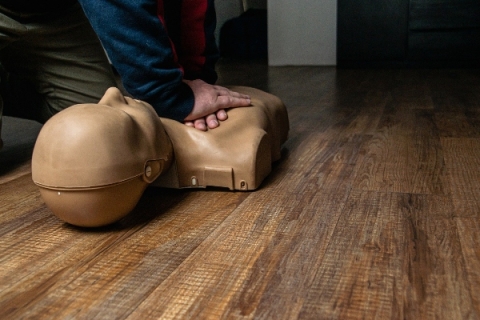
Portsmouth is the first city in the south to host a restart a heart day to help citizens learn how to save a life in the precious minutes between a 999 call and an ambulance arriving.
People who suffer a cardiac arrest outside of a hospital have a roughly 1:10 chance of survival, but if more people knew how to start CPR (cardiopulmonary resuscitation) and use a defibrillator, the odds would shift in more people’s favour.
The event from 10.30am-4pm on October 15, in Commercial Road, is open to all.
We have big dreams that hundreds or even thousands of people will be trained ... potentially saving many lives.
Rob Isherwood, Senior Teaching Fellow
What started as a University of Portsmouth exercise, to train students and staff, has since grown beyond the university walls and the aim is now to teach thousands of people, from school children to pensioners, how to save a life.
Rob Isherwood, a course lead for paramedic science at the University of Portsmouth, is leading the event.
He said: “Portsmouth is very lucky to have has a higher than average number of defibrillators dotted across the city, 20 of those in university buildings with full public access, but very few people have been trained in how to use one.
“However, the UK has a poor track record of members of the public starting CPR and in the use of community-based defibrillators, which means that only about 10 per cent of people survive their cardiac arrest to being discharged from hospital.
“Across Europe, the numbers are much higher, with, for example, in countries where the communities are trained to start CPR and use the defibrillator like Scandinavia, as many as 35 percent of people will survive to being discharged from hospital.
“Numbers aside, we know that the person you are likely to need to resuscitate is a loved one or member of your household and these skills are the things that can make the all-important difference.
“Currently no other university appears to be doing anything like this, and it’s early days, but we have big dreams that hundreds or even thousands of people in Portsmouth will be trained in the coming few months, potentially saving many lives.”
In 2020, the average response time for an ambulance nationally was seven minutes.
Mr Isherwood said: “The survival rate for someone suffering a heart attack drops by 10 per cent a minute. If more people knew how to use a defibrillator while waiting for the ambulance crew to arrive could very well save a life. Having these skills is truly valuable and anyone can learn.”
Ahead of the event, Mr Isherwood’s team have already trained nearly 100 students, most of whom were recruited at this year’s freshers fair.
Traditional CPR, where the first aider did chest compressions and breathed into the unconscious person’s mouth have been dealt a blow by the covid pandemic, and by research, which now shows chest compressions alone are sufficient to keep someone alive until an ambulance arrives.
The restart a heart day is a community-based event, with South Central Ambulance Service and St John Ambulance providing the manikins and training student volunteers; Portsmouth City Council providing the venue, outside H&M on Commercial Road; and the university’s Student Union and first aid society offering support. The Wedgewood Rooms has offered the event its sound system, and will also be raising funds for its own defibrillator to be installed at its venue.
